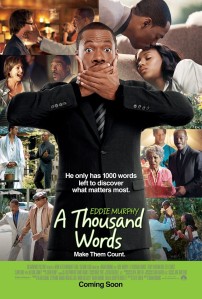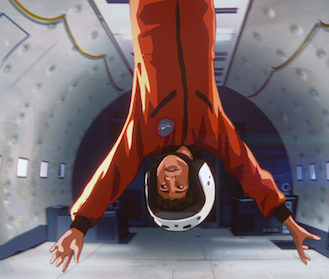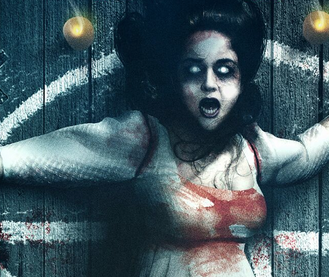A Thousand Words is a film made for no one; especially if you’re a person who talks back to the screen. If you aren’t one of those loud patrons yet, A Thousand Words may very well convert you. It did for me.
Eddie Murphy’s latest vehicle has his character Jack McCall having a tight leash on his vocabulary. After a mysterious tree grows in McCall’s backyard, he learns that with each word he speaks, the tree loses a leaf. If the tree ends up bare of leaves, Murphy’s body will be bare of life.
As I watched Murphy exaggerate each mannerism and facial expression and stress every short word he speaks, I couldn’t help but ask question after question about the film’s logic.
“Murphy’s character only has 1000 words left to speak? Why doesn’t he write what he wants to say?”
The movie, as if hearing my inner monologue, shows that when Jack McCall writes, the tree loses as many leaves as words he writes.
To which I asked,
“Well, why doesn’t he take a small dry erase board, write the words he needs like, “I’ve lost my voice” and hang the board from his neck. That way, when people see his board, he technically doesn’t say that phrase over again.” The film offers no explanation.
With each situation director Brian Robbins and screenwriter Steve Korean offer their audience, they dare you to think of how it could’ve been done better. The average movie goer thinks of an alternate and better plan of action almost immediately, to which they’re then rewarded to watching how two incapable men fumble the scene.
I don’t expect for a silly premise such as this one to be scientifically perfected but I do expect the minds behind the film to follow their own blueprint.
For example, when McCall out of sheer frustration flips off the tree, the tree loses two leaves (in the film’s only clever joke). However, when Murphy holds up his hand for someone to stop, the tree doesn’t lose a leaf. I guess the tree is just really sensitive.
The film’s made for no one because tonally it’s all over the map and because of this, it’s unable to please anyone of any age.
The scenes featuring Murphy talking to clients as a literary agent and the moments where Murphy is trying to deal with his Alzeimers-laden Mother (hammed up, unfortunately, by Ruby Dee) are too heavy and bogged down in sedateness for children to enjoy. While the scenes featuring Murphy making faces, screaming and interacting with slapstick comedy feel too featherbrained for something that’s intended for teens or adults.
With that, the rest of the ensemble, like Dee, overact but are also stuck with unfunny set-ups and punchlines. A joke where McCall’s assistant (played by Clark Duke) feels like he has to emulate Murphy’s voice (and for some reason talk…slang?) to connect to clients is just one of the many jokes that are DOA.
Just because Murphy’s character is forced to be bigger with his actions due to his lack of vocals doesn’t mean everyone should follow in his footsteps nor should the director or the screenwriter.
Because of the hammy performances and the combination of a broken script and misguided direction, A Thousand Words is an obnoxious and stupid ordeal.
According to an online word count, I used 578 words proving that in this loopy world of death-by-speaking, I get to stay alive. Just doing that calculation and fighting pop-up ads was a more fun and pleasing experience than watching A Thousand Words.




I have read a few excellent stuff here. Definitely price bookmarking for revisiting.
I surprise how a lot attempt you set to make the sort of wonderful informative website.
An fascinating dialogue is price comment. I believe that you should write extra on this matter, it won’t be a taboo subject but usually people are not enough to talk on such topics. To the next. Cheers
Wow! Thank you! I permanently needed to write on my site
something like that. Can I implement a portion of your
post to my site?